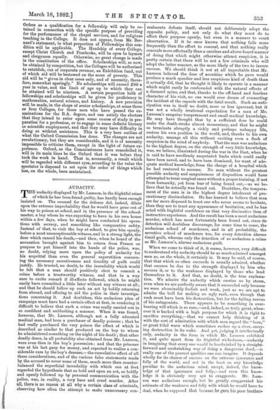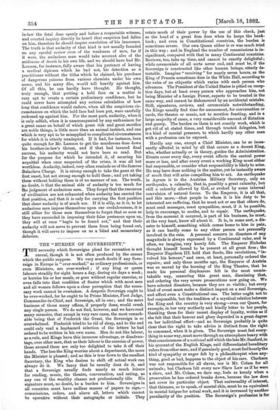AUDACITY.
9r7audacity displayed by Mr. Lamson, in the frightful crime f which he has been found guilty, has hardly been enough insisted on. The counsel for the defence did, indeed, dilate upon the extreme improbability that he would have gone out of his way to poison at school, and in the presence of the school. master, a boy whom he was expecting to have in his own house within a few days, when he might have conducted his opera- tions with secrecy, and something like comparative safety. Instead of that, to visit the boy at school, to give him openly, before a most unexceptionable witness, and in a strong light, the dose which caused his death,—and then, when he heard of the accusation brought against him to return from France on purpose to put himself into the hands of the police, was, no doubt, relying more upon the policy of audacity for his acquittal than even the general superstition concern- ing the necessary secretiveness and timidity of guilt could justify. He trusted, no doubt, to the incredulity which would be felt that a man should positively elect to commit a crime before a trustworthy witness, and that in a way sure to excite remark if ill-effects followed, which he might easily have committed a little later without any witness at all; and that he should follow up such an act by boldly returning from abroad, and offering to aid the police in their investiga- tions concerning it. And doubtless, this audacious plan of campaign must have had a certain effect at first, in rendering it difficult to believe that such a crime was really carried out in so confident and unblushing a manner. When it was found, however, that Mr. Lamson, although not a fully educated medical man, had been a purchaser of deadly poisons ; that he had really purchased the very poison the effect of which is described as similar to that produced on the boy to whom he administered something on the night of his death ; that other deadly doses, in all probability also obtained from Mr. Lamson, were even then in the boy's possession; and that the prisoner was at his last gasp for money, and expected to realise a con- siderable sum by the boy's decease,--the cumulative effect of all these considerations, and of the various false statements made by the accused to cover some of them, much more than counter- balanced the superficial incredulity with which one at first regarded the hypothesis that so bold and open an act, so boldly and openly followed up by personal communication with the police, was, in reality, a very base and cruel murder. After all, there is no reason at all why a certain class of criminals, observing how often the attempt to make unnecessary con- cealments defeats itself, should not deliberately adopt the opposite policy, and not only do what they must do to effect their purpose openly, but even in a manner to court observation. If it be once known that nothing fails more frequently than the effort to conceal, and that nothing really conceals more effectually than a careless and above-board manner of doing that which might otherwise attract suspicion, it is pretty certain that there will be not a few criminals who will adopt the latter manner, as the more likely of the two to insure success. We should think it not at all improbable that Mr. Lamson believed the dose of aconitine which he gave would produce a much speedier and less suspicious kind of death than it actually did, that he thought it likely to operate in a manner which might easily be confounded with the natural effects of a diseased spine, and that, thanks to the off-hand and fearless character of his visit, no one would ever dream of connecting the incident of the capsule with the fatal result. Such an anti- cipation was in itself no doubt, more or less ignorant, but it was not a wholly irrational expectation for a man of Mr. Lamson's sanguine temperament and small medical knowledge. He may have thought that by a sufficient dose he could make the death-stroke almost momentary, and that he might so terminate abruptly a sickly and perhaps unhappy life, restore his own position in the world, and, thanks to his own audacity, manage all this without exciting even a flash of suspicion in the mind of anybody. That the man was audacious to the highest degree, on the strength of very little knowledge, was, we believe, illustrated during the war in the East, when he is said to have needlessly amputated limbs which could easily have been saved, and to have been dismissed, for want of ade- quate medical knowledge, from the charge of a hospital which he had ventured to assume. No man without the greatest possible audacity and sanguineness of disposition would have attempted to treat surgical cases without a proper training, if .not from humanity, yet from fear of being found out,—as we be- lieve that he actually was found out. Doubtless, the tempera- ment of the man is in the highest degree intolerant of pre- cautionary dissimulation. He has learned to believe that men are far more disposed to trust one who never seems to hesitate, than they are to trust any appearance of hesitation, and he has acted with frightful confidence on that very diminutive item of
instructive experience. And the result has been a most audacious murder, which has most fortunately been found out, since its detection will doubtless discourage, for some time to come, the audacious school of murderers, and in all probability, the secretive school of murderers too, for every detection alarms timid guilt, whereas only the detection of so audacious a crime as Mr. Lamson's, alarms audacious guilt.
When we come to think of it, it seems, however, very difficult to understand why audacity should be as much admired amongst men as, on the whole, it certainly is. It may be said, of course, that that which so often succeeds is usually admired, whether that success be due to the strength displayel by him who secures it, or to the weakness displayed by those who lend themselves to it. And that, no doubt, is the true explana- tion. We admire the audacity which carries us by storm, even when we are perfectly aware that it succeeded only because we were abominably foolish and weak, just as we are apt to admire the bull for making an ugly rush, even though that rush must have been his destruction, but for the failing nerves of his antagonists. There appears to be something in over- bearing will which is so rare,—and, indeed, so truly great, when- ever it is backed with a high purpose for which it is right to sacrifice everything,—that we cannot help thinking of it with the sort of admiration with which men regard the "bore," or great tidal wave which sometimes rashes up a river, carry- ing destruction in its wake. And yet, judging it intellectually only, audacity in the form in which Mr. Lamson exhibited it, and quite apart from its frightful wickedness,—audacity in imagining that every one would be hoodwinked by a straight- forward and unshrinking way of doing a dangerous deed,—is really one of the poorest qualities one can imagine. It depends wholly for its chance of success on the extreme ignorance and folly of the world, and not in the least on any knoviledge peculiar to the audacious mind, except, indeed, the know- ledge of that ignorance and folly,—and even this know- ledge it is obviously very apt to exaggerate. Mr. Lam- son was audacious enough, but he greatly exaggerated his estimate of the weakness and folly with which he would have to deal, when he supposed that because he gave his poor brother-
in-law the fatal dose openly and before a respectable witness, and courted inquiry directly he heard that suspicion had fallen
on him, therefore he should inspire conviction of his innocence. The truth is that audacity of that kind is not usually founded on any careful review even of the weakness of men, for if it were, the audacious man would take account also of the evidences of deceit in his own life, and we should have had Mr. Lamson, for instance, fully aware that his pretence of having a medical diploma which he had not, his detection as a practitioner without the titles which he claimed, his purchase of dangerous poisons from various chemists under his own name, and his many fibs, would tell heavily against him. Of all this, he can hardly have thought. He thought, truly enough, that putting a bold face on a matter is very apt to create a certain preliminary confidence, but he could never have attempted any serious calculation of how long that confidence would endure, when all the suspicious cir- cumstances on which the bold face had been put, were carefully reckoned up against him. For the most part, audacity, when it is only selfish, when it is unaccompanied by any enthusiasm for a great cause on behalf of which great risk and great sacrifice are noble things, is little more than an animal instinct, and one which is very apt to be misapplied to complicated circumstances for which it is utterly unadapted. If it had, for instance, been quite enough for Mr. Lamson to get the murderous dose down his brother-in-law's throat, and if that had insured final success, his audacity would not have been so mad. But for the purpose for which he intended it, of securing his acquittal when once suspected of the crime, it was all but worthless. Audacity, indeed, very often reminds us of the famous Balaclava Charge. It is strong enough to take the gam at the first onset, but not strong enough to hold them ; and yet taking them without holding them is of no manner of use. The truth, no doubt, is tit the animal side of audacity is too much for the judgment of audacious men. They forget that the resources of civilisation are not exhausted when audacity has carried the first position, and that it is only for carrying the first position that sheer audacity is of much use. If it is silly, as it is, to let audacious men impose themselves upon our credulousness, it is still sillier for those men themselves to forget that so soon as they have succeeded in imposing their false pretences upon us, they will at once "begin to be found out," and that their audacity will not serve to prevent them from being found out, though it will serve to impose on us a blind and momentary delusion.



































 Previous page
Previous page